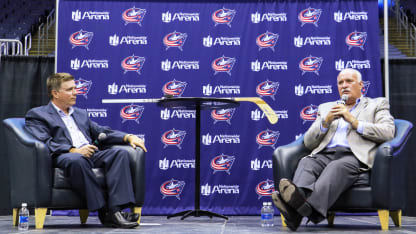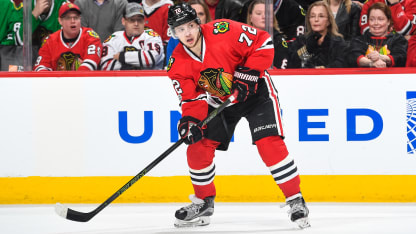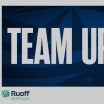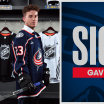This is the second part of a series of articles featuring Q&A sessions with Blue Jackets president of hockey operations John Davidson. He sat down with CBJ radio host Bob McElligott to talk about his approach and philosophy when evaluating potential deals, including the most recent acquisition of Artemi Panarin. For part one of this series, please click here. Part three of this series is coming soon.
McElligott: Sending Brandon Saad back to Chicago in exchange for Artemi Panarin, can you just tell us from the management standpoint, what did you like about Panarin that make you feel the need to make that deal?
Q and A with John Davidson: the Artemi Panarin trade
Davidson discusses his approach and philosophy when evaluating potential deals

By
BlueJackets.com Staff BlueJacketsNHL / BlueJackets.com
Davidson: I'll back it up a little bit. The expansion draft - we have no control over that. The rules are the rules. The league tells us what the rules are, and you have to comply. If it had been a year earlier we wouldn't have lost anybody or had to worry about anything. This season, if we would have just let them pick who they wanted, we could have lost Ryan Murray, Jack Johnson, Josh Anderson. So, we decided we're going to make a deal with them, and we gave up something to make sure that we knew, and they knew, which player they were going to get. It's always a hard thing to lose somebody that's been part of our building here, but we just had to do it, and so we got through that. The Panarin deal is interesting. We just feel we need a little more scoring up front. He's a dynamic player. I think he's going to be a player that is really going to pull people out of their seats. He's exciting to watch, he's fast, he'll move the puck across the offensive zone, he's got a one-time shot that is as good as anybody's in the league that'll help us power play-wise and other things. We're just excited about it. Now, Brandon Saad played well for us, but Chicago knew him. The big difference to be honest is Brandon's got four years left on a contract, Panarin's got two. So, Chicago has caught certainty going forward. We have a player for two years and it's going to be up to us if he comes here and everything goes well, we'll have to resign him. But that's okay, you win with really good players, and he's a really good offensive player. We feel that that's just helping us drive forward to get to where we want to get to, and that's to win a Stanley Cup. That's what we're all here for. We're an exciting team, and that'll make us more exciting, so we feel really good about where we are. The other thing, when you go through the process of trying to revamp an organization, you try as hard as you can to build up assets. And one of the things about assets, is your team gets better. We took a nice forward drive last season with the likes of (Zach) Werenski and others. If you have assets you have a chance of making deals to get a player that's going to help you get even better. Sometimes it takes two or three to get one, but we've worked hard over the past four or five years to build those assets up. Whether you can do it or not, who knows, whether somebody's going to give something up, who knows, but we're in the business of trying to make this team better and not do it where it's at the expense of losing what we're trying to do. We want to do this smartly. A lot of people would like to see us go out and trade this, this, this and get that; you just can't do it. Plus, you don't want to jeopardize the foundation of building a team as you move forward.

© Bill Smith/Getty Images
McElligott: Everybody is looking to get the most they can and you have to make sure, as you just said, that you can't over give. It's got to be sensible, it's got to work for both sides.
Davidson: I've always believed that deals should basically be fair deals. I've always believed that when a player's up for a contract it should be a fair contract. Everything should be under the premise of doing the right thing. Some people think differently; some people try to rob you, but you've just got to say no. That's how it works. The (Ryan) Johansen for Seth Jones trade was a terrific hockey trade for both cities, for both teams. I love those types of things. Now, what happens is, if you're a team, and you've got a really good player, and he's going to want out of this team or whatever it is, then you have an asset that somebody else might want. So, you have to try to find a way, if that asset is going to help you, to make that deal. Sometimes, you've got to give to get, that's just how it works. So, you've got to really balance with what you're giving and what you're getting to make your team better if it fits. And hockey's a very interesting game - I mean, I've been in this league since 1973 when I started as a player, that's a long time ago, and I'm still learning. That's just how it works, and it's a very, very complex puzzle to get a certain player. Is he a right hand shot, is he a left hand shot, does he have enough speed, can he win faceoffs, will he be a shooter or a play maker, how many years left on his contract, where does he fit down the road with our cap situation, and it goes on and on and on. So it's not a perfected science by any means, especially when you're drafting young people from all over the world. It's flat out amazing where these kids get drafted from. When you sit at the draft and hear these names and hear where they played and where they're from, there's parts of Russia that none of us have ever heard of that these kids are coming from, but our scouts have been there. It's fascinating how all this works. It's a lot of fun. The blood pressure's low right now, but it gets going starting in early October, and that's what makes it fun for everybody. I mean we can sit here and talk about our Columbus Blue Jackets and know we're in a good place, but we as management understand that (the fans) are part of it too. Whether you're season ticket holders, fans who watch it on TV or whatever it is… we're all kind of in this thing together as we push forward.


















